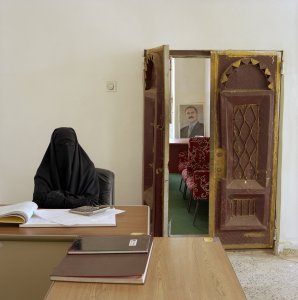Presented By: Institute for the Humanities
Jan Banning talk & book signing

Literati is pleased to welcome photographer Jan Banning in support of Bureaucratics and Law & Order, and in conjunction with the exhibition at the University of Michigan's Institute for the Humanities gallery and Duderstadt Center gallery.
Bureaucratics is a project consisting of a book and a traveling exhibition that has so far been shown in museums and galleries in some twenty countries on five continents. The book and the exhibition contain 50 photographs and are the product of an anarchist’s heart, a historian’s mind and an artist’s eye. Bureaucratics is a comparative photographic study of the culture, rituals and symbols of state civil administrations and its servants in eight countries on five continents, selected on the basis of political, historical and cultural considerations: Bolivia, China, France, India, Liberia, Russia, the United States, and Yemen. In each country, Jan visited up to hundreds of offices of members of the executive in different services and at different levels. The visits were unannounced and the accompanying writer, Will Tinnemans, by interviewing kept the employees from tidying up or clearing the office. That way, the photos show what a local citizen would be confronted with when entering.
Bureaucratics is a project consisting of a book and a traveling exhibition that has so far been shown in museums and galleries in some twenty countries on five continents. The book and the exhibition contain 50 photographs and are the product of an anarchist’s heart, a historian’s mind and an artist’s eye. Bureaucratics is a comparative photographic study of the culture, rituals and symbols of state civil administrations and its servants in eight countries on five continents, selected on the basis of political, historical and cultural considerations: Bolivia, China, France, India, Liberia, Russia, the United States, and Yemen. In each country, Jan visited up to hundreds of offices of members of the executive in different services and at different levels. The visits were unannounced and the accompanying writer, Will Tinnemans, by interviewing kept the employees from tidying up or clearing the office. That way, the photos show what a local citizen would be confronted with when entering.